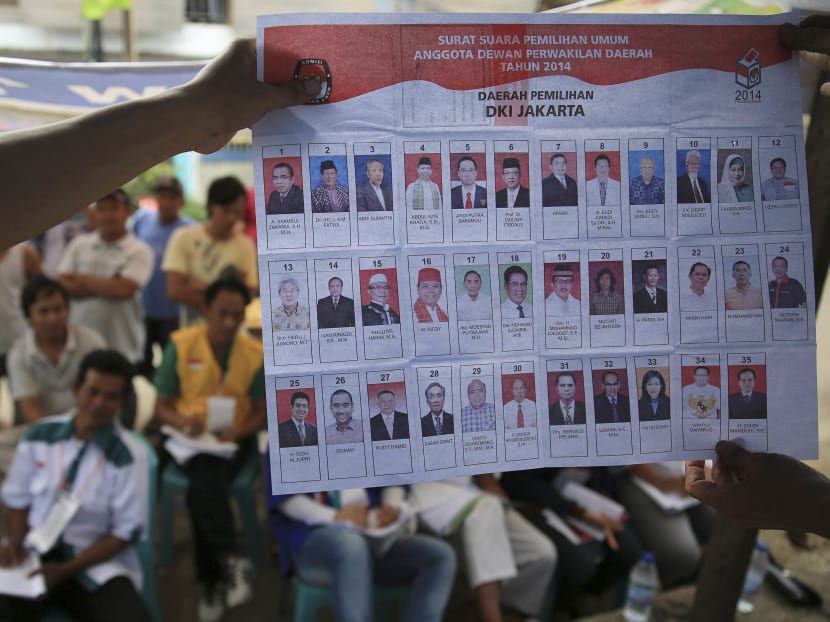Leading 3 Indonesian parties unlikely to form coalition
JAKARTA — A week after Indonesia’s parliamentary election, coalition deal-making in Indonesia is in full swing and it looks increasingly likely that the three leading parties will not be allies.

People watch as electoral officials show ballot papers during vote counting at a polling station in Jakarta. Photo: REUTERS
JAKARTA — A week after Indonesia’s parliamentary election, coalition deal-making in Indonesia is in full swing and it looks increasingly likely that the three leading parties will not be allies.
Disagreements over nominations for presidential and vice-presidential candidates, as well as the close gap between the percentage of the vote won by medium-sized parties, mean the chances of a coalition among the Indonesian Democratic Party of Struggle (PDI-P), Golkar and Gerindra are slim, said analysts.
Last week’s parliamentary poll saw the PDI-P emerge the front-runner in early results, securing about 19 per cent of the vote. Official results will be announced early next month. Parties need to win at least 25 per cent of the vote or 20 per cent of seats in the 560-seat Parliament to nominate presidential or vice-presidential candidates.
Over the weekend, the PDI-P struck a deal with a small party, NasDem, meeting the 25 per cent requirement and clearing the way for its presidential candidate Jakarta Governor Joko Widodo to run for President in July.
Reports suggest the alliance could soon include the National Awakening Party (PKB), a moderate Islamic party.
Analyst Tiarma Siboro from Jakarta-based Concord Consulting said this is because the Nahdlatul Ulama, Indonesia’s largest Muslim organisation affiliated with the PKB, has thrown its support behind the PDI-P.
The PKB did better than expected in the election, winning more than 9 per cent of the vote, up from 5 per cent in 2009. Together, the three parties will command an almost 35 per cent share of the popular vote.
Pundits argue that Mr Widodo would need 35 to 40 per cent of the vote to better dictate terms in Indonesian politics. He has warned against an unwieldy coalition of many parties — a line reiterated by the PDI-P’s Ms Puan Maharani in an interview published in The Jakarta Post yesterday.
“It’s better for us to form a small coalition with only a few parties, which will remain solid until the end of the five-year term, rather than a big coalition that will fight among itself,” said Ms Puan, daughter of party chief Megawati Sukarnoputri, who led the PDI-P’s campaign in the election.
Reports suggest that Gerindra, the third-best performer with nearly 12 per cent of the vote, is keen to partner the ruling Democrat Party, which won less than 10 per cent. A third party likely to join the mix is the conservative Islamic Prosperous Justice Party. Together, the group will have about 30 per cent of the vote.
Political scientist Ari Dwipayana from the University of Gadjah Mada said that, unlike the PDI-P, Gerindra prefers a big coalition and will be looking for as many coalition parties as possible as a symbol of support.
“With the PKB likely to join the PDI-P and NasDem, Gerindra and Golkar are in the competition over mid-sized parties,” he added.
Golkar, the second-most-popular party in the poll with 15 per cent of the vote, looks to have the fewest options at the moment. It has partnered Hanura, which won only 5 per cent of the vote. This means the grouping is still short of the 25 per cent requirement to nominate presidential candidates.
Ms Siboro observed that mid-sized parties such as the National Mandate Party and United Development Party, which each won 6.5 to 7.5 per cent of the vote, have shown a preference to join the PDI-P and Gerindra instead of Golkar.
Party executives involved in talks on coalition forming are tight-lipped on developments. “It’s a matter of political ethics,” said Golkar Deputy Secretary-General Tantowi Yahya.
Analysts said things could still change in the coming days and weeks. “The political reality is very dynamic and the political mapping can change every time,” said Ms Siti Zuhro from the Indonesian Institute of Sciences.






